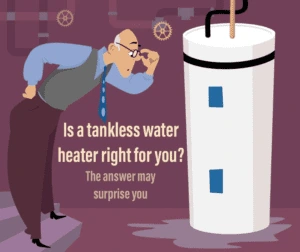What Are The Benefits Of A Tankless Water Heater And Is It Right For You?
Hot water…ah, what a beautiful thing hot water on demand is to have, and we often can take for granted all of the luxuries of modern life – that is until the storage tank in our hot water heater runs out because 2 people are taking a shower after putting on a load of clothes in the washing machine and your hot water supply is zapped from the water usage demands being put on your standard tank water heater.

While being able to turn on your faucet and feel that cold water turn to piping hot, there may be a more energy-efficient method, a tankless hot water heater, and heating element type to turn that water tap hot without eating so much heat loss, and possibly lower your energy costs and have lower energy bills than that of a traditional water heater.
Let’s find out if an energy-efficient tankless water heater is right for you.
There are many opinions and benefits of tankless water heaters and it can be a little difficult to get some clear information about them. Energy Star ratings, flow rates, warranty, installation costs, and life expectancy are all questions homeowners have when it comes to a new water heater, especially water heater installations for tankless models, or if you’re converting from a gas water heater to electric models. Some say they love them, while others haven’t had a great experience with them, but moving from a gas burner to something that uses less energy and takes up less space is something worth considering!
So, what does a tankless water heater do and how does it work? Here’s the lowdown!
Tankless units store little-to-no water, as compared to conventional water heaters where they can be considered storage water heaters. They only heat water when you’re using hot water so they don’t waste energy heating a large tank of water even when you’re not using it, which is why they are also referred to as on demand water heaters.01 They also heat water much more efficiently than their tank-type counterparts. These two energy-saving advantages equate to an annual water-heating energy savings of about 50%. They’re also much smaller than their tank-type counterparts. So, if space is at a premium, a tankless may help. They sit idle and ready for water flow to be detected. Once you open a tap they jump into action.
These impressive water heaters will supply hot water from the moment you open a tap until that tap is closed, providing you with truly endless hot water. Once you close the tap, the unit will power-down and wait for the next chance to get to work. This style of water heating is very beneficial for households of all sizes. Having a large family means you need a lot of hot water. Tankless water heating will mean you are never running out of hot water again. Even if your kids take a 1-hour shower!
They’re also great for houses with large bathtubs. These tubs are all but impossible to fill with a standard water heater. We’ve all been there too. The tub is half full when the water heater runs out of hot water. With a tankless, you can fill the tub to the brim with piping hot water and immediately follow that up with laundry, dishes, and showering! Lastly, they are great for newly empty-nesters. These households can go from two people during the week to 4 or more people on the weekends as the kids come home from college or family comes in for the holidays. Tankless water heaters can run efficiently and minimally for the family of two and then ramp up to handle the maximum duty needed for the weekend return of the college student….and their friends….and their laundry….and their friends’ laundry!
Do You Currently Have 2 Or More Water Heaters?
If so, your tankless decision makes a lot more sense. The upfront costs of tankless are very similar to replacing two tank-type water heaters. So, when it comes time to replace your tanks, do yourself a favor and consider tankless. Have an onsite consultation with a master plumber at Climate Control Heating and Cooling, Inc. to see if a tankless water heater is the best application for you.
Should You Consider A Gas Or Electric Unit?
Gas. The only correct answer is gas. They do make electric tankless units but they are mostly designed for a point-of-use application (single fixture) and are not recommended in the residential world. It would take a home-sized electrical service just to power an electric tankless large enough for an average home and even then, your electric bill would be insane. Most homes have a 100-amp or 200-amp service to feed the entire home. An electric tankless water heater would mean doubling the size of the home’s electrical service. This is not cheap. Ultimately, heating water with resistance elements is just plain expensive no matter if it’s in a tank-type or tankless application. So, the only tankless unit worth considering for your home is a gas unit.
Can They Use Your Current Water Heater’s Metal Vent Pipe?
No. Tankless units will vent out the sidewall of the home with plastic vent piping. That’s right, plastic! They remove so much heat from the combustion gasses and their flue temperatures are so cool that they can use plastic vent piping. In fact, they have to be vented in plastic or stainless-steel piping because condensation develops within the flue piping. This condensation is a sign of a highly efficient gas appliance.
Is Your Gas Line Sized Correctly For A Tankless System?
Yes. We have several options for a tankless water heater at our fingertips. Some of those options will actually pull natural gas into the unit rather than relying on the gas pressure to push the natural gas. This means the unit can be installed on your existing water heater gas line. There are a few rare occasions where we would need to modify the homes’ gas line, but those cases are limited and very unique in nature.
Can You Still Use Your Hot Water Recirculation System With A Tankless Water Heater?
Yes! One of the tankless units we offer is actually designed for hot water recirculation. It comes with a built-in recirculation pump and it can tie into your current recirculation system. Or we can add an instant hot water recirculation system for you. It can even learn your daily hot water heater usage patterns and ensure that you have instant hot water ready to go each morning!
“What about annual maintenance? I heard they need to be flushed out every year, and that it’s expensive.”
Tankless units may require routine flushing to keep them flowing freely year after year. The timing of that flushing all depends on your local water quality. In the Kansas City metro area, our water hardness generally ranges from about 5–9 grains of hardness. There are a few tankless manufacturers who say that annual flushing is only required if your hardness is in excess of 7 grains of hardness. This puts us right on the verge of whether annual flushing is needed or not. We usually recommend having the unit flushed within the first 12-24 months of installation and then, based on how productive the flushing was, we make a flushing schedule that suits your water condition. We have even been known to actually suggest that you not need to flush your tankless due to your better than average water quality!
“I have heard that tankless water heaters are problematic. Is this true?”
Quality installation is a must if the unit is to perform as expected. In our experience, we have found most problematic tankless units were improperly installed. This poor installation causes numerous issues that usually get blamed on the unit rather than the installation. Having an installer that has been factory-trained to install your tankless is very important. It also helps to have a company who is well versed in maintaining tankless water heaters. They can use their tankless maintenance experience to improve the installation quality even further. Ultimately, when tankless water heaters are installed by factory-trained installers, they perform better than expected.
“What about rebates from the gas company?”
Yes! It’s very common for your gas company to offer you an incentive for upgrading to a tankless water heater. These rebates can range from $200-400, sometimes more and can offer huge help in offsetting the cost. So, if you are considering a tankless, make sure to call your gas provider and inquire about potential rebates.
“What does all this mean for me?”
Basically, if your household only has 1-2 people and no large bathtub, you might not see the full benefits of a tankless water heater. However, if your household has; 3 or more people, 2 or more water heaters, a large bathtub, natural gas within the home, or if you just want to be energy aware, then tankless may be for you.
Climate Control Heating and Cooling, Inc. is your trusted resource for tankless water heaters in Kansas City, MO. Contact us today for “Comfort & Care from the Team with the Bear”!





